|
|
|
Schwetzinger
Zeitung, Montag 27. September 2004
Fascinating Dance Theatre from
the Court of Louis XIV, the Sun King
|
|
| TEATRO ARCIMBOLDO with "The
Tromba Marina Virtuoso" at the Mozartfest Schwetzingen |
|
|
Thilo Hirsch and his TEATRO ARCIMBOLDO
performed the most exquisite Baroque dance theater last week at
the Rokokotheater Schwetzingen (Hirsch is the founder of the
group, 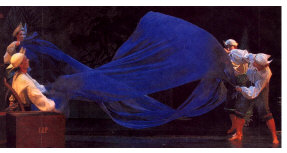 and
appeared in the title role of Jean-Baptiste Prin) […..]. Under
the imaginative direction of Hirsch, the tragicomic story of the
only known trumpet marine virtuoso J.-B. Prin (1668-1743) is
presented […..]. Hirsch’s acting was superb as he explained
the construction and sound of the trumpet marine. The
characteristic feature of the tromba marina (played in masterly
fashion by Hirsch) are the resonance strings at the inside of
the instrument’s body. […..] Smooth performances of
Harlequin, Harlequina and Pantalone in a Commedia dell’Arte
Scene. The story gained intensity in a gloomy prison scene
danced by torturers and Zanni in the Bastille. After Prin’s
forced exile in the West Indies, one of the evening’s dancing
highlights was the scene on the ship –the successful struggle
of the sailors with the wild storm was shown with acrobatic
jumps and artful pantomime. At the end of his trip, Prin arrives
in the jungle where he meets African slaves and identifies in
their "Ungurungu" the origins of the trumpet marine.
The evening convincingly ends with a dance dialogue between the
cultures (music: J.Ph. Rameau). With inventive choreography,
props, and imaginative costumes, TEATRO ARCIMBOLDO took the
audience along on a journey to bygone times. An unforgettable
tribute to the tromba marina. and
appeared in the title role of Jean-Baptiste Prin) […..]. Under
the imaginative direction of Hirsch, the tragicomic story of the
only known trumpet marine virtuoso J.-B. Prin (1668-1743) is
presented […..]. Hirsch’s acting was superb as he explained
the construction and sound of the trumpet marine. The
characteristic feature of the tromba marina (played in masterly
fashion by Hirsch) are the resonance strings at the inside of
the instrument’s body. […..] Smooth performances of
Harlequin, Harlequina and Pantalone in a Commedia dell’Arte
Scene. The story gained intensity in a gloomy prison scene
danced by torturers and Zanni in the Bastille. After Prin’s
forced exile in the West Indies, one of the evening’s dancing
highlights was the scene on the ship –the successful struggle
of the sailors with the wild storm was shown with acrobatic
jumps and artful pantomime. At the end of his trip, Prin arrives
in the jungle where he meets African slaves and identifies in
their "Ungurungu" the origins of the trumpet marine.
The evening convincingly ends with a dance dialogue between the
cultures (music: J.Ph. Rameau). With inventive choreography,
props, and imaginative costumes, TEATRO ARCIMBOLDO took the
audience along on a journey to bygone times. An unforgettable
tribute to the tromba marina. |
|
Basler
Zeitung, Dienstag 17. August 2004
Baroque Rapture
|
|
| Delightful: The Dance Theatre
Production „The Trumpet Marine Virtuoso" by TEATRO
ARCIMBOLDO (Basel) |
|
|
TEATRO ARCIMBOLDO presented the busy life of
a baroque musician: Jean-Baptiste Prin (1669-1743) was promoted
by his father to become the only known virtuoso on the
"Trompette marine", this curious string instrument
whose sound is produced using flageolet technique on a single
long string that runs over a vibration bridge – a sound
resembling that of a muted trumpet. Prin’s playing on this
instrument appears to have been so masterful that his career
took him all the way to the court of the sun god Louis XIV.
However, after years of slander and defamation Prin was forced
into exile in Mexico. |
| The flavor of a
comedy |
|
For years, TEATRO ARCIMBOLDO (directed by
Thilo Hirsch) has been a master of its trade in reviving ancient
musical times with sensuous and colorful productions. Their
latest piece once again is delightful musical theatre. No doubt,
the educational aspects of the production were intentional, but
these were neatly woven into the skilfully constructed monologue
(screenplay: Christopher Zimmer and Thilo Hirsch). When we were
given a stilted courtly introduction to the complexities of the
art of Baroque dance; when the panic-stricken Prin, fearing
punishment and torture, recites the whole store of knowledge of
the time; or when we were explained various baroque torture
methods or the political situation in Mexico - the flavor always
remained that of a comedy, cleverly connecting the individual
scenes.
Even the
somewhat risky final scene was convincing: Here Prin’s
encounter with dancing African slaves is presented as the birth
of multiculturalism.
Of
course, as in any baroque music theatre there was the inevitable
storm scene, an idyllic moon-and-stars ballet, a wonderful
"theatre within the theatre" scene of a commedia dell’arte
rehearsal (the performance of which brings out the opposite of
the result intended by the jealous director), and even a
magnificent courtly dance by the sungod himself, ritualised all
the way to the trembling of the fingers. The performance of the
dancers was elegant, strong, and deeply touching to the
present-day audience. |
| Dramatic Music |
| In
addition to a "Concert pour la Trompette
marine" by Prin himself, music by the Baroque masters was
played, including Lully, Marais, Forqueray, and of course
Jean-Philippe Rameau. A perfect match in this setting, Rameau’s
music is always dramatic, and carried the musicians and,
thereby, the audience to a state of Baroque rapture. |
|
David Wohnlich |
|
Schwetzinger
Woche, Donnerstag 30. September 2004
Der Meerestrompettist
|
|
|
[.....] The dance group (Barbara Leitherer,
Irene Pedrotti, Dietmar Vonwiller and, in particular, Bernd
Niedecken), 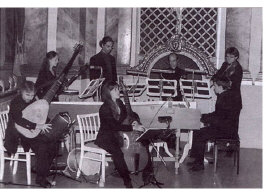 stylistically
hit a golden, Baroque home run. […..] The Baroque orchestra
played music that complemented the action on stage, composed by
Marais, Lully, Prin, Rameau and Forqueray. The musicians were
superb, and were able to display their incisive qualities and
clear sound in a wide range of situations: in lyrical soloist
passages and classical dance pieces of the time, and also in
full dynamic orchestral interventions "with trumpets and
drums" and the dramatic concluding dance of the African
slaves. The marvellous costumes were made by Gigliola Vinci und
Clara Sarti (La Scala/Milan) […..]. Overall, it was a precious
jewel of a performance which the audience acknowledged with a
hurricane of long lasting applause. stylistically
hit a golden, Baroque home run. […..] The Baroque orchestra
played music that complemented the action on stage, composed by
Marais, Lully, Prin, Rameau and Forqueray. The musicians were
superb, and were able to display their incisive qualities and
clear sound in a wide range of situations: in lyrical soloist
passages and classical dance pieces of the time, and also in
full dynamic orchestral interventions "with trumpets and
drums" and the dramatic concluding dance of the African
slaves. The marvellous costumes were made by Gigliola Vinci und
Clara Sarti (La Scala/Milan) […..]. Overall, it was a precious
jewel of a performance which the audience acknowledged with a
hurricane of long lasting applause. |
|
kob. |
|
Fränkischer
Tag, Mittwoch, 29. September 2004
Baroque Dance Art
|
|
| TEATRO ARCIMBOLDO from Basel at
the Schwetzinger Rokokotheater |
|
|
"TEATRO ARCIMBOLDO" is a traveling
theater, which for years now has been been performing at nothing
but the most beautiful historic theaters of Germany. […..].
Thilo
Hirsch, the group’s director and tromba marina player, never
misses an opportunity to give the evening the flavor of a
comedy, but always managing a convincing balance between
historical fact and entertainment. The dancing king:
unbelievably beautiful costume and choreography (Barbara
Leitherer, dance teacher at the Schola Cantorum)[.....]. Special
word of praise for the imaginative and ever changing costumes,
but particular praise for a fantastic ensemble of musicians who
played historic percussion instruments, violins, bassoon,
harpsichord, theorba, viola da gamba, and recorder on a
magnificent level – nothing unusual perhaps for musicians
coming from the capital of old music with its Schola Cantorum
Basiliensis. |
|
W. S. |
|
Orpheus
Oper International 11/2003
Gotha/Ekhof Festival–
A Win with Telemann
|
|
|
... Completely satisfying was the performance of "Don
Quixote." The young Baroque theater ensemble TEATRO
ARCIMBOLDO from Basel created an imaginative, colorful stage
spectacle. Telemann’s opera, supplemented by several dances,
was scenically so imaginatively and lovingly presented that it
was a joy to behold. Musically, too, the performance was a
delight. All the participants, some of them singing and dancing
several roles, performed under the direction of Thilo Hirsch
with perceptible vitality and a joy that was infectious.
|
|
Karin Coper |
|
Sonntag-Aktuell
(Ulm), 16 September 2001
Magical playing and dancing, sonorous singing, historical
instruments, splendid Baroque costumes:
|
|
|
...With the seldom-performed "comic chamber-ballet opera"
by G. Ph. Telemann, the ensemble TEATRO ARCIMBOLDO from Basel
provided a magical, much-applauded finale to the Sebastian
Sailer Days. In the sold-out Mirror Hall of Obermarchtal
Monastery, they offered a real eye catcher and plenty of Baroque....
Specialists in Baroque and Renaissance music, it is hardly
surprising that with their splendid voices and pantomimic,
theatrical pizzazz the members of the ensemble were able to find
exactly the right approach for Telemann’s music. Tumultuous
applause.
|
|
Christa Kanand |
|
Basler
Zeitung, 21 August 2001
A huge crowd on the weekend at the premiere of the
comic chamber-ballet opera "Don Quixote, the Knight of the
Lion" by Georg Ph. Telemann in the English Department of
the University.
|
|
|
...The chamber-music, dance-theater ensemble "TEATRO
ARCIMBOLDO" carried the festive audience away to a baroque
world full of adventure and beset with mental torments. To come
right to the point: A marvelous production by Thilo Hirsch, full
of magic, grace, and humor. A charming, imaginative, witty
summer delight.
|
|
Christa Mosimann |
|
Basler
Zeitung, Monday, 26 October 1998
Amorous Dance Entanglements
|
|
|
If music be the food of love, then "TEATRO
ARCIMBOLDO",
a Baroque chamber-music/ dance-theater ensemble, had the right
recipe on Friday evening to whet the audience's appetite. Under
the title "If music be the food of love" or
"Amorous Delight and Viol Tricks", the Baroque piece
presented on the stage of the Marionette Theater on Münsterplatz
dove into the magic of the golden age between the Renaissance
and the Classical period. Where marionettes usually spin their
threads, historically costumed actor-musicians revealed the
broad spectrum of all the fine arts with their 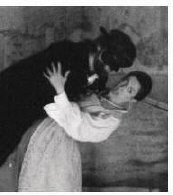 intricate-enchanting
scenes. These were framed by romantic sounds from the pen of
Henry Purcell through Claudio Monteverdi to the highly
ornamented compositions of Michel Pignolet de Monteclair. What
visibly opened the hearts of the audience, and came to their
ears in pure, clearly defined intonation, and polished vocal
refinements, overcame "Fileno" (Thilo Hirsch, tenor)
and "Lilla" (Araceli Fernandez, soprano) - during an
amorous tête-à-têtè - like golden rain. Yet the brazen
"Colombina" (Barbara Leitherer, soprano/dance)
attempts to foil the dalliance, with its interludes in commedia
dell'arte style, so that the steadfast nobleman, with his true
love in mind, remains obstinate and erect in his
"culottes." An allegorical hurly-burly in the
entanglements of love, hate, and vengefulness comes about,
scenes full of black humor at which one can grin or even laugh
loudly. intricate-enchanting
scenes. These were framed by romantic sounds from the pen of
Henry Purcell through Claudio Monteverdi to the highly
ornamented compositions of Michel Pignolet de Monteclair. What
visibly opened the hearts of the audience, and came to their
ears in pure, clearly defined intonation, and polished vocal
refinements, overcame "Fileno" (Thilo Hirsch, tenor)
and "Lilla" (Araceli Fernandez, soprano) - during an
amorous tête-à-têtè - like golden rain. Yet the brazen
"Colombina" (Barbara Leitherer, soprano/dance)
attempts to foil the dalliance, with its interludes in commedia
dell'arte style, so that the steadfast nobleman, with his true
love in mind, remains obstinate and erect in his
"culottes." An allegorical hurly-burly in the
entanglements of love, hate, and vengefulness comes about,
scenes full of black humor at which one can grin or even laugh
loudly.
A dazzling piece of
pure theater that - under the direction of Thilo Hirsch and with
the refined sounds of the viola da gamba and lute, played by
Agileu Motta - was literally chock-full of scintillating dance,
pantomime, and vocal treasures. |
|
Eva-Maria von Sauer |
|
Thüringer
Allgemeine, 30 July 1999
IF MUSIC BE THE FOOD OF LOVE
|
|
|
Baroque Pleasure with "TEATRO ARCIMBOLDO" at the
Ekhof Festival Gotha in Schloss Friedenstein provides a
wonderful ambience for the small theater troop from Basel that
is making a guest appearance here under the auspices of the
Ekhof Festival. Behind the title "If music be the food of
love" or "Amorous Delight and Viol Tricks," it is
easy to recognize Master Shakespeare. If music be the food of
love, there is no skimping here. The actors of "TEATRO ARCIMBOLDO,"
five young musicians who are entirely at home in dance and
singing, have dedicated themselves to the music of the
Renaissance and the Baroque. The timbre of the historical
instruments create in the musical citations from distant 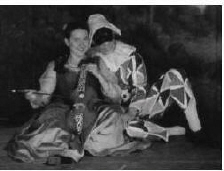 centuries
an idea of the magic of these epochs of art. It is fascinating
how well Molière and Shakespeare get on together, and how well
the music of Monteverdi corresponds to that of Purcell or
Monteclair, sometimes harmonically flirting, sometimes providing
interesting contrasts. Smooth transitions are provided for by
that busy master of ceremonies Arlecchino, who makes it hot not
only for his Colombina. The Baroque chamber-music/dance-theater
ensemble takes the theme "Amorous Delight and Viol
Tricks" quite literally, arranging scenes and musical
citations into an exciting collage. The whole is a loose weave
of hovering narrative threads, with a dusting of Italian humor
as well as smoking-pistol "English humour." Passionate
"Dialoghi amorosi," held in check by Cupid's arrow,
bring good spirits to both players and audience. centuries
an idea of the magic of these epochs of art. It is fascinating
how well Molière and Shakespeare get on together, and how well
the music of Monteverdi corresponds to that of Purcell or
Monteclair, sometimes harmonically flirting, sometimes providing
interesting contrasts. Smooth transitions are provided for by
that busy master of ceremonies Arlecchino, who makes it hot not
only for his Colombina. The Baroque chamber-music/dance-theater
ensemble takes the theme "Amorous Delight and Viol
Tricks" quite literally, arranging scenes and musical
citations into an exciting collage. The whole is a loose weave
of hovering narrative threads, with a dusting of Italian humor
as well as smoking-pistol "English humour." Passionate
"Dialoghi amorosi," held in check by Cupid's arrow,
bring good spirits to both players and audience.
The timbre of the
historical instruments and the vitality of the commedia
dell'arte form an artistic symbiosis with the enchanting
scenery, which does not fail to make an effect. |
|
Lilo Plaschke |
|
Schwäbische
Zeitung, Friday, 23 July 1999
Ulm Summer Music Days / A Shot from the Gamba
|
|
|
NEU-ULM - Munich native Thilo Hirsch, who enjoyed a rounded
musical education, had an idea in 1996: He founded the ensemble
"TEATRO ARCIMBOLDO" with the goal of performing
Renaissance and Baroque music in its original sense of a
"theatrical entertainment". Peter Bücheler discovered
the illustrious ensemble in Basel, and immediately engaged it
for the 25th Ulm Summer Music Days. In Edwin Scharff House in
Neu-Ulm they presented "If music be the food of love"
(Amorous Delight and Viol Tricks), a Baroque chamber-music
dance-theater, to an enthusiastic 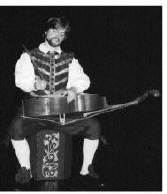 audience.
Even the use of historical instruments such as the viola da
gamba, chitarrone, and lute for the performance of music by
Monteverdi, Caccini, and Purcell up to that of Michel Pignolet
de Monteclair offered great pleasure. But the framework in which
this time-honored music was presented provided the evening's
fascination. In the footsteps of commedia dell'arte, texts by
Molière and scenes by Shakespeare were performed in conjunction
with song, dance, and fascinating instrumental contributions. audience.
Even the use of historical instruments such as the viola da
gamba, chitarrone, and lute for the performance of music by
Monteverdi, Caccini, and Purcell up to that of Michel Pignolet
de Monteclair offered great pleasure. But the framework in which
this time-honored music was presented provided the evening's
fascination. In the footsteps of commedia dell'arte, texts by
Molière and scenes by Shakespeare were performed in conjunction
with song, dance, and fascinating instrumental contributions.
Three backdrops
mounted on large frames, opened one after the other, show the
respective scene of action. Custom-made, contemporary costumes,
accurate to the last detail, created the requisite atmosphere
for the four scenes. Already the first piece, "Ghirlande
amorose," put the audience in a good mood. Shakespeare's A
Midsummer Night's Dream was the background for the second scene,
which was just as successful as the third, based on the theme of
"English humour," with music by Thomas Ford and Tobias
Hume. The playing of the reconciled pair, Captain Hume and Mrs.
Hume, was splendid. The latter had shortly before shot her
rival, namely with a viola da gamba. Sitting behind her, it soon
becomes obvious who calls the tunes here.
The last scene is
entitled "Fête Champestre." The enchanting
introduction with music by Marais and Monteclair, to which the
shepherdess Lisette plays and dances a sarabande ("Les
folies d'Espagne"), is followed by pitch-black drama.
Enthusiastic and well-deserved applause for the visitors from
Basel. |
|
Barbara Percovac |
|
BADISCHE
ZEITUNG, 25 September 1998
„TEATRO ARCIMBOLDO": The
burlesque, turbulent side of the Baroque
|
|
|
That the musical epoch of the Baroque also had a burlesque,
turbulent, entertaining, and theatrically effective side was
shown on Saturday evening in Weil's Old Town Hall by
"TEATRO ARCIMBOLDO," which was founded in 1996 by
Thilo Hirsch.
In the first scene,
"Ghirlande amorose," it quickly became clear: It did
not have to do with deep, existential feelings. The fundamental
attitude was that of light, playful virtuosity. Fileno disguised
himself as Vespone, became involved in a brilliant vocal duel
with Lilla (Araceli Fernandez), which then - as Fileno revealed
his identity - evolved into an elaborate duet with much
ornamentation. There was not much to the apparently so deeply
felt love, for Fileno willingly lets himself be ensnared by
Colombina (Barbara Leitherer) with song and dance.
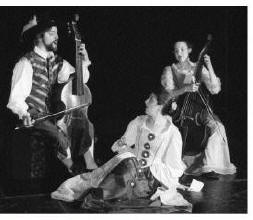 The heart of the
performance was formed by the two scenes, "A Midsummer
Night's Dream" and "English humour," based on
Shakespeare. Here, too, turbulent about turns, mirages, and
aberrations: First, a vision, to which Motta provides the
congenial accompaniment with sparkling, meditative runs, then
Hume's real courtship of Molly, who is ultimately felled by the
Captain's wife with a pistol shot. Here the actors show their
extraordinary, versatile abilities most impressively: While
Thilo Hirsch plays a gamba duet with Barbara Leitherer, he woos
the soprano playing the role of Molly with his song. And after
her apparent death, an even more unusual duet: Hirsch and
Leitherer play four-handed on one gamba. The heart of the
performance was formed by the two scenes, "A Midsummer
Night's Dream" and "English humour," based on
Shakespeare. Here, too, turbulent about turns, mirages, and
aberrations: First, a vision, to which Motta provides the
congenial accompaniment with sparkling, meditative runs, then
Hume's real courtship of Molly, who is ultimately felled by the
Captain's wife with a pistol shot. Here the actors show their
extraordinary, versatile abilities most impressively: While
Thilo Hirsch plays a gamba duet with Barbara Leitherer, he woos
the soprano playing the role of Molly with his song. And after
her apparent death, an even more unusual duet: Hirsch and
Leitherer play four-handed on one gamba.
Something that hoped
to be successful at princely courts had to include excursions
into all genres: The last scene therefore combined idyll and
horror romantic in the story of the shepherdess and dancer
Lisette (Barbara Leitherer). The audience honored the
performance with enthusiastic applause. |
|
hf. |
|
Volksstimme
Sissach, 16 Juni 1998
"TEATRO ARCIMBOLDO" -
high standard
|
|
|
On Sunday afternoon in Liestal's "Palazzo," the
young ensemble "TEATRO ARCIMBOLDO" abducted its
audience into another world for almost two hours. Music of the
Renaissance and early Baroque was offered under the title
"If music be the food of love" as "Baroque
chamber-music dance-theater." A distinctly original idea by
the ensemble's founder and director Thilo Hirsch.
In four scenes, the
magic of that earlier time unfolded in the unanimity of
representation, song, and music in the gay opalescence of the
costumes. The music of Monteverdi, Caccini, Purcell, Sances, and
others was combined collage-like with texts by Molière and
Shakespeare, and could develop to best advantage in the play of
love's heartache and joy.
Special attention has
to be called to the high artistic standard of all the ensemble
members, beginning with the excellent gambist and tenor Thilo
Hirsch, who masters the "cantar alla viola," and his
partner Araceli Fernandez, whose clear soprano voice has a rich
spectrum of colors at its disposal, and whose Baroque gestures
were a joy to behold. Amazing were the abilities of Barbara
Leitherer in expressive gamba playing and light-footed
historical dance. Reliably active in the background was Agileu
Motta with sonorous lute and chitarrone. Dancing and singing,
all four also joined together in polyphonic song.
The whole is an
exquisite treasure, not only for connoisseurs, that conveys,
even into details, a taste of that Baroque joy of living that
can gild everyday life.
|
|
E.J.
|
|
|